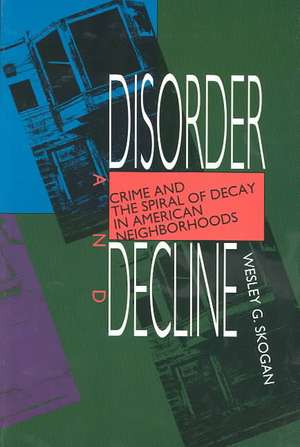Disorder & Decline
Autor Skoganen Limba Engleză Paperback – 30 iun 1992
Preț: 238.30 lei
Nou
Puncte Express: 357
Preț estimativ în valută:
45.62€ • 47.42$ • 37.82£
45.62€ • 47.42$ • 37.82£
Carte tipărită la comandă
Livrare economică 07-21 februarie 25
Preluare comenzi: 021 569.72.76
Specificații
ISBN-13: 9780520076938
ISBN-10: 0520076931
Pagini: 218
Dimensiuni: 153 x 228 x 15 mm
Greutate: 0.33 kg
Editura: University of California Press
ISBN-10: 0520076931
Pagini: 218
Dimensiuni: 153 x 228 x 15 mm
Greutate: 0.33 kg
Editura: University of California Press
Textul de pe ultima copertă
"Crime, disorder, and decay symbolize the decline of America's inner cities. Skogan's book is theoretically acute, methodologically sophisticated, and politically astute. It should be required reading for every urban sociologist, policy planner, and public official."--Jerome H. Skolnick, University of California, Berkeley
"Panhandling, graffiti, prostitution, abandoned cars and buildings, and junk-filled lots are evidence of neighborhood disorder and decline. In this absorbing and valuable study, Skogan discusses the implications of disorder and skillfully analyzes experimental efforts undertaken to confront it in several American cities."--Gilbert Geis, University of California, Irvine
"This timely book not only documents the relationship between disorder and neighborhood decline, but provides a cogent analysis of the currently favored solutions to problems such as community policing and citizen self-help."--Dr. Thomas A. Reppetto, President, Citizens Crime Commission of New York City
